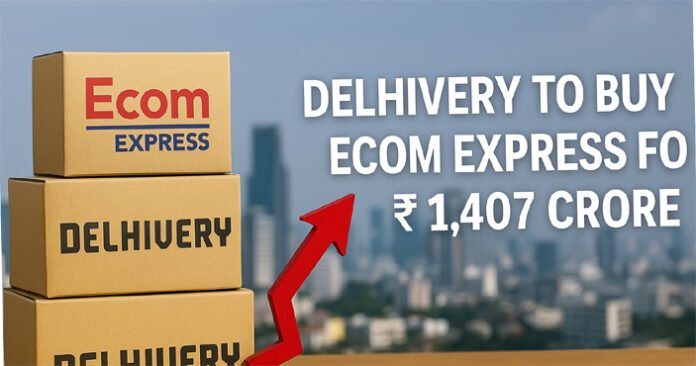
New Delhi, April 5 — In a major move that’s set to reshape India’s logistics industry, Delhivery Ltd has announced its plan to acquire rival Ecom Express for ₹1,407 crore. Once completed, the acquisition will turn Ecom Express into a subsidiary of Delhivery — strengthening the company’s foothold in the fiercely competitive e-commerce delivery space.
This high-value transaction signals a turning point for India’s last-mile delivery ecosystem, bringing two of the largest players under one roof.
What Delhivery’s Acquisition of Ecom Express Means
The deal was confirmed through a regulatory filing on Saturday. Delhivery stated that it had entered into a share purchase agreement with Ecom Express and its shareholders. The acquisition is subject to standard closing conditions and approval from the Competition Commission of India (CCI).
“We believe this acquisition will enable both companies to better serve their customers through continued large investments in infrastructure, technology, network and employees,” said Sahil Barua, CEO and Managing Director of Delhivery.
This isn’t just another merger — it’s a strategic consolidation aimed at streamlining costs, boosting delivery speeds, and improving nationwide access for clients ranging from online retailers to D2C brands.
Why This Deal Is a Game-Changer for Indian Logistics
Ecom Express, founded in 2012 and headquartered in Gurugram, is one of India’s leading end-to-end tech-enabled logistics providers. Its financials tell a story of steady growth:
FY22 revenue: ₹2,090 crore
FY23 revenue: ₹2,548 crore
FY24 revenue: ₹2,607 crore
With an authorized share capital of ₹2,400 crore and a paid-up capital of ₹420.73 crore, Ecom Express has carved out a sizable market share in e-commerce logistics.
According to Ecom Express founder K. Satyanarayana, the acquisition marks the beginning of a “new growth phase” that will allow the combined entity to scale faster and deliver greater value across sectors.
🧾 Deal Timeline and Legal Details
Delhivery expects to complete the acquisition within six months, pending regulatory clearances. However, the timeline could be extended by mutual agreement.
The company has roped in Shardul Amarchand Mangaldas & Co. as legal advisors, while Ernst & Young (EY) will handle financial and tax due diligence.
Background: From Rivalry to Unity
This acquisition comes just a year after Delhivery publicly accused Ecom Express of misrepresenting shipment volumes and profitability metrics in its Draft Red Herring Prospectus (DRHP).
At the heart of the issue was how both companies calculate shipment volumes. While Delhivery counts a shipment once — even if it’s returned — Ecom Express counts it twice, leading to inflated numbers. Despite the disagreement, both companies have now decided to join forces for long-term growth.
India’s E-Commerce Boom Demands Stronger Logistics
India’s logistics sector is at an inflection point, fueled by rapid e-commerce adoption, rising smartphone penetration, and the expansion of Tier 2 and Tier 3 markets.
With platforms like Flipkart, Amazon, Meesho, and Nykaa ramping up operations, logistics efficiency is no longer a backend issue — it’s a core competitive advantage.
This deal positions Delhivery as a clear frontrunner in India’s logistics race, helping it consolidate routes, reduce redundancies, and tap into a shared delivery ecosystem with greater precision and speed.
What It Means for Businesses and Consumers
For Businesses: Faster deliveries, better reach in rural and remote areas, and access to a wider logistics tech stack.
For Consumers: More reliable service, faster delivery timelines, and fewer missed or delayed packages.
For the Industry: Consolidation means reduced fragmentation, higher efficiency, and better investment potential.
Delhivery’s Big Bet on the Future
Delhivery’s ₹1,407 crore acquisition of Ecom Express isn’t just about buying a competitor — it’s about building a stronger, smarter logistics future for India. As the demand for faster, cheaper, and more tech-enabled deliveries grows, this mega-deal may just be the blueprint for what the next era of Indian logistics looks like.















